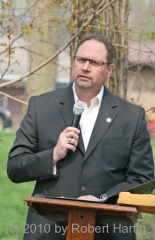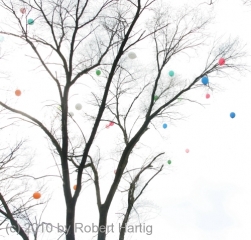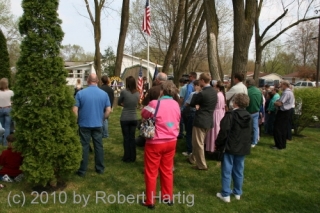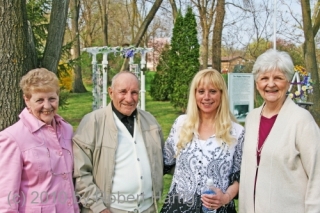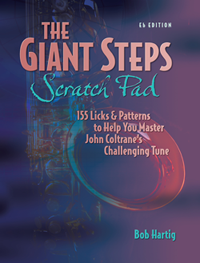“The thief comes only to rob and kill and destroy; I have come that [you] may have life, and have it to the full.”–Jesus (John 10:10)
Forty-five years after he lost his younger brother in one of the 1965 Palm Sunday Tornadoes, Pete Johnson still finds it hard to talk about what happened that dreadful evening in northern Indiana. He feels responsible for his brother’s death.
The name Pete Johnson is fictitious. I doubt the man I interviewed yesterday afternoon would mind if I shared his real name or that of his brother, but my conversation with him is so fresh, and my topic so potentially sensitive, that out of care and respect I’m calling him Pete in this post.
Pete was with his family visiting an aunt and uncle in Dunlap, Indiana, when the deadliest tornado of the entire six-state outbreak swirled into view outside the picture window. As his relatives sought shelter indoors, Pete’s parents packed the kids into their car and took off down the road in a frantic attempt to outrun the tornado. They didn’t succeed. Pete’s dad told him that a house hit the car. All Pete remembers is experiencing a blow to the head and then regaining consciousness out in a field, where he’d been blown by the wind. Rescue workers rushed him off to a hospital. It would be some time before he learned that his younger brother, Mark, hadn’t survived.
Mark’s body wasn’t found until a week later, buried under debris in the devastated Sunnyside neighborhood. Pete wants to believe that his brother’s death wasn’t his fault. But still, after all these years, he wonders: What if…?
What if he’d gone straight to the car instead of hiding in the closet, as his aunt had told him to do? Maybe those few extra seconds would have saved his brother’s life. What if his family had ridden out the tornado at his aunt and uncle’s house, which sustained only minimal damage? What if…?
There’s no satisfying the what-ifs of survivor guilt. You can respond to them with your head, perhaps, but your heart doesn’t buy the answers, not when the wound goes as deep as the loss of a loved one taken by a disaster. There’s seemingly no closure, no tying off of the open ends, no last stone to turn after which the supply of unturned stones finally ceases. At the bottom of it all lies a tyrannical, perpetually haunting lie: “I’m to blame.”
People with survivor guilt suffer–and “suffer” is an appropriate word–from a form of self-imposed penance for not having been the one to perish instead of their loved one. Reliving the incident year after year, they blame themselves for failing to foresee the unforeseeable and stop the unstoppable, for not preventing things over which they had no power. Really, for not being God.
Tornadoes are quirks of the atmosphere, not so much objects as unfathomably powerful processes dependent on an ironically delicate balance of ingredients. Earlier this year I watched one take out the heart of an Illinois town, then disappear into nothingness seconds later. Like lions and Alaskan brown bears, tornadoes are magnificent but also deadly and unpredictable.
As a storm chaser, I’m captivated by the beauty and drama of tornadoes. Yet I’m also keenly aware of their dark side. Who isn’t? The human impact of tornadoes, when it occurs, is seldom conservative and often it’s wholesale. Homes blown to pieces. Trees debarked, debranched, uprooted and thrown hundreds of feet. Vehicles crumpled into balls of metal. Worst of all, bodies mangled and lives ended.
But there’s another kind of damage that can’t be seen. Long after the dead have been buried, long after houses and neighborhoods have been rebuilt, years after people have gotten on with their lives, a sadness lingers. And for many, survivor guilt haunts them. You can build a new home, you can buy a new car, but you can’t replace a loved one, and what do you do with your own wounded heart?
I believe there’s healing for those who struggle with survivor guilt. I don’t mean the sorrow of losing someone close; that will always remain, and it is not necessarily a bad thing. But the sting of guilt which serves no good purpose is exactly the kind of thing Jesus came to put an end to.
Let me be clear, as I share from a Christian perspective, that I have little interest in dogma, any more than Jesus did. The wounds that life can inflict are too real for game-playing. But just as it’s possible to glibly quote the Bible in a way that misses its meaning and heart, it’s equally possible to lightly dismiss the Bible and so miss not only its unnervingly pinpoint assessment of the human condition, but also the power and hope of the gospel for some very practical life issues.
The life, ministry, and teachings of Jesus reveal the heart of a God who desires that we should find true, deeply rooted peace in our souls that flows from the peace we have with him. For those who trust in him, Jesus has resolved the issue of guilt in all its forms, including survivor guilt, with a power and effectiveness that extend beyond the unpredictable events of our lives to a deep and certain, eternal foundation. In his execution on the cross, Jesus took everything that runs counter to the character and will of God and, absorbing it into himself as the eternal scapegoat for mortal mankind, put it to death. Then, in his resurrection, he opened the doorway to a new kind of life that is not subject to the values and limitations of this world.
This is fancy language, but for those who struggle with survivor guilt, the bottom line is simple: God looks at you and says, “Not guilty.” His heart toward you is that you should have life, not death; peace, not self-recrimination. That’s no mere religious proposition–it’s the living, breathing, passionate longing of God for your best, your freest, and your highest.
Given the reality of what God desires for you, the question isn’t whether you could have done something that might have saved your loved one. You’ll never know. That question is a deception from the devil, who loves to torment people with issues that have endless complexities and no resolution. It’s really no question at all–it’s a prison sentence and a distraction from the simplicity of faith. The true, powerful question is whether you’ll stop holding yourself accountable when God himself doesn’t, and stop beating up an innocent person whom he loves very much: yourself.
As you consider that question, here’s another one to contemplate along with it: If the situation had been reversed and you had been the one who perished while your loved one lived, would you have wanted your surviving loved one to live the rest of their days with the guilt that has haunted you? Wouldn’t you rather have desired with all your heart that he or she would think of you with love but not guilt, and fulfill the gift and potential of their life in freedom?
What you would want for your loved one would surely be your loved one’s desire for you. Love does not condemn, but frees and blesses.
I realize that what I’ve proposed is easier said than done. I just want to put the possibility before you–the seed of a new way of thinking which, I hope, can make a difference for you. I’m well aware that I haven’t experienced what you’ve experienced. My struggles have been my own. Yet they have been significant in their own right, and in the face of them, Jesus has made me a freer man as only Jesus can. So my words to you are spoken both humbly and frankly, with a longing that you should know peace at last, peace that only the love and grace of God can bring.
One of the titles by which the Scriptures call Jesus is “Prince of Peace.” The peace he offers rests not on life circumstances, but on an interpersonal relationship with him in which the quality of life that resides in him flows to us. It is a life in which guilt, shame, and torment can’t be found. If you belong to him, then the peace which is native to that life is more than his will for you–it is your very birthright as a child of God.
My prayer for you, if you struggle with survivor guilt, is that your birthright will become real to you in a way that frees you from a weight that is not really yours to carry. Bring it to Jesus and trust him with it. You don’t know what to do with it; he does. Letting him do so is a journey he’s eager to make with you if you’re willing to make it with him.
